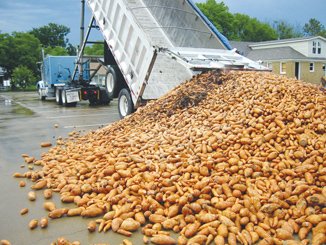BIG ISLAND, Va. — An ancient biblical practice has been adopted by some Baptists in Southwest Virginia in response to increasing hunger needs in America’s uncertain economy.

This year’s sweet potato drop at the Bland Ministry Center in Southwest Virginia provided fresh produce for the holidays for area residents.
|
Old Testament farmers were told not to pick their fields and vineyards clean, but instead to leave what was growing on the edges for orphans, widows and travelers. Today that biblical practice — known as gleaning — is providing opportunities for churches and individuals. By hand-gathering crops left in fields and orchards after harvest, they are salvaging fresh produce that otherwise would go to waste and sending it to soup kitchens and food banks across the country.
Since 1979 the Society of St. Andrew’s [http://www.endhunger.org/] mission has been to share God’s grace with people by meeting their hunger needs. In 2010 more than 30,000 volunteers rescued 18 million pounds of produce through the Society’s Gleaning Network. Based in Big Island, Va., the society has a regional office in Durham, N.C., as well as in other states.
“Gleaning has become a family tradition for us,” says Jennifer Rich, a member of Journey Church [http://journeyconnection.com/], a Baptist congregation in Roanoke, Va. She and her family were at Johnson’s Orchard in Bedford, Va., on Oct. 22 when 1,500 pounds of apples were gleaned from the ground and donated to the New Prospect Food Pantry in nearby Amherst County. Earlier in the year the family had gleaned corn.
“It’s a wonderful way for kids to be involved in missions and to do something for others together as a family,” she says.
Rich admits that the apples were not the bright, shiny ones on display in a grocery store. But they can still be eaten raw or used for cooking, especially in applesauce or pies.
Danny Johnson, owner of Johnson’s Orchards, has been part of the St. Andrew’s Society (SOSA) from its beginning. Since 1995 when the agency created a database, Johnson has allowed for the gleaning of more than 900,000 pounds of produce, mostly apples and peaches. Before St. Andrew’s came along, the food went to waste.
Edible food remains in fields for several reasons, say farmers. Mechanical harvesting misses much of it and it isn’t profitable for laborers to hand-pick the remains. Some produce may lack the visual perfection required to make it to supermarket shelves. Or a farmer may have an issue of supply and demand — more of a certain crop was produced than could be sold.
A team from Sandston (Va.) Baptist Church [http://www.sandstonbaptistchurch.com/] arrived at Gallmeyer Farm outside of Richmond, Va., on Nov. 5 to glean fall crops such as squash, turnips and collards. Many green tomatoes and a variety of peppers remained on the vine. Kay Carter had brought nearly 20 volunteers from Sandston to glean that morning. It was the first experience for several of them.
Carter admits that she’s a re-use and recycle person, not wanting to see anything wasted. She spotted a brochure about SOSA at church and made the call about the ministry. In the tough economic environment, she says she thought it would be a great mission project.
Carter was inspired last month when she served with a team that gleaned 130 pounds of broccoli from a farm in Oak Grove, Va. About 70 pounds of broccoli was taken to the African Community Church in Richmond. And Glinda Ford, community missionary for the Church Hill Christian Wellness Center, a ministry of the Richmond Baptist Association, came to Sandston to pick up the remainder of the broccoli for families served by the center.
Jacqueline Paris-Pugh, Richmond area coordinator for SOSA, says the organization strives to get the food in the hands of local food banks and ministries as quickly as possible. Approximately 50 percent of crops gleaned in the Richmond area are distributed by the Central Virginia Food Bank. [https://feedmore.org/food-bank] The remaining 50 percent goes to local organizations and church food ministries.
“Canned food is great,” says Paris-Pugh, “but fresh produce is what low-income people can’t afford. For them to receive fresh produce for free is not only healthier but is something they’d not be able to purchase in the grocery store.”
Gleaners are people of all ages and incomes. Paris-Pugh tells of an 84-year-old woman who gleans tomatoes during the summer, even on days with three-digit temperatures. After a morning of picking, the elderly woman takes the tomatoes home and cans them. When her congregation hosts CARITAS, [http://www.caritasshelter.org/] a ministry to the homeless, she makes spaghetti sauce and chili from the tomatoes she’s preserved. And along with other produce that she’s frozen and canned, the church is able to feed the homeless without spending a lot of money on food.
SOSA’s Potato and Produce Project salvages tractor-trailer loads of potatoes and other products that are rejected by commercial markets or potato chip factories due to slight imperfections. The project is extremely successful and cost effective because the only expense involved is transportation.
The Bland (Va.) Ministry Center, [http://blandministrycenter.org/] located in the mountains of Appalachia, has been the recipient of truckloads of potatoes from SOSA for the past 15 or 20 years, says its director Dee Dee Hoosier. The drop is announced over the local radio station and in other ways throughout the community. People come with bags to take home some of the 35,000 pounds of sweet potatoes brought to the center, which is affiliated with the East River Baptist Association [http://www.vbmb.org/apps/Churches/Associations-details.cfm?ID=11] and the Virginia Baptist Mission Board. [http://www.vbmb.org/]
“Families requesting help at the food pantry this year have increased by 75 percent,” Hoosier reports. “The drop of sweet potatoes is a blessing and enables us to reach more people.” And she adds, “Receiving them two weeks before Thanksgiving is an added blessing.”
In addition to its offices in Virginia and North Carolina, the Society of St. Andrew operates regional offices in Alabama, Florida, Georgia, Mississippi, Missouri and Tennessee. It also operates in contiguous states, including those where it does not have gleaning ministries, by distributing food to organizations that serve the nations hungry through its Potato and Produce Project.
“Gleaning is a way for me to feel like I’m being a better steward of what God provided,” says Rich. “It’s a ministry where you can provide something tangible to people in need regardless of how much cash you have in your wallet.
“I hope we are teaching our children that a life well-lived is not focused on self, but on others and we do that because we love God,” she adds.
Barbara Francis is a staff writer for the Religious Herald.





